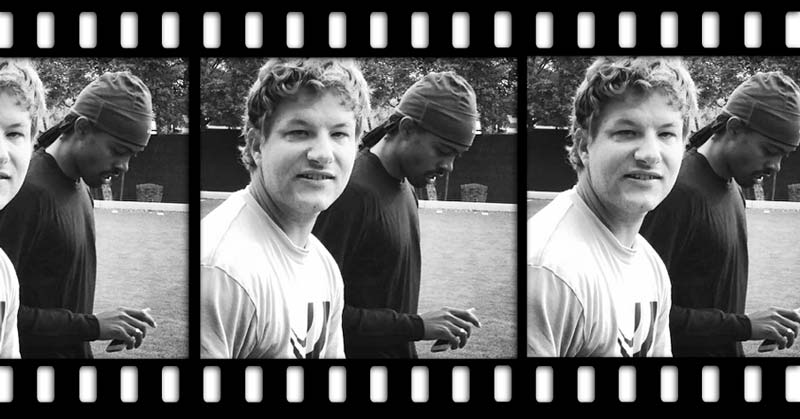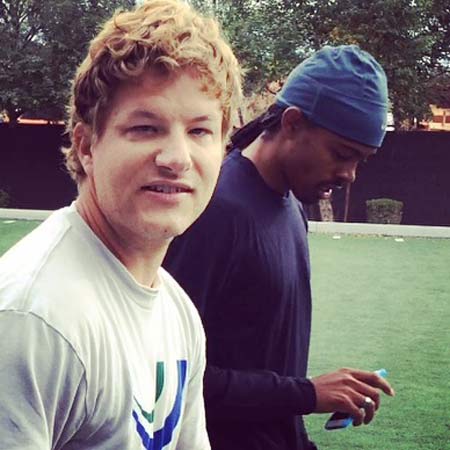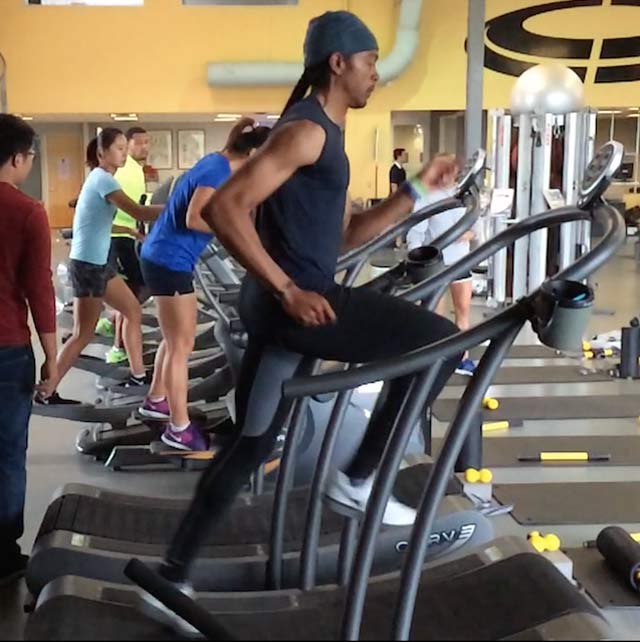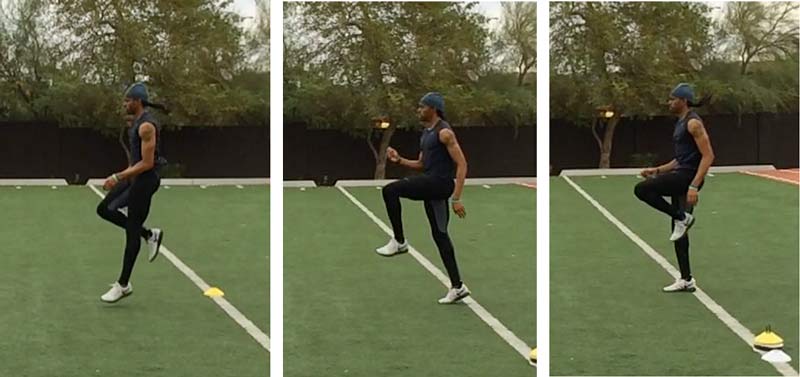
By Tyrone Edge
American hurdler Aries Merritt’s 2012 season was the stuff that dreams are made of:
- World 60m indoor champion in March
- Olympic 110m gold medal in August
- 110m world record 12.80 in September
But his dream began turning into a nightmare soon after setting his WR when he realized something wasn’t right. In fact, something was very wrong. He was not healthy. For a time, even the Mayo Clinic was stumped. He was eventually diagnosed with a rare genetically caused kidney disease, a condition he amazingly kept private until this past week, on the eve of the 2015 World Athletics Championships. He announced he would undergo a kidney transplant four days after his race, with his sister donating the kidney.
Hearing the story, I was stunned. How could Aries and his coach Andreas Behm manage to keep this distressing news quiet for three whole years without ever making a single excuse? How did they navigate this life-changing event as coach and athlete?
I spent a few days with Andreas and Aries last November at the World Athletic Center (now Altis) in North Phoenix, Arizona. I watched them run through a Saturday workout.

Figure 1. Coach Andreas Behm with Aries Merritt.
It was immediately apparent that they are both incredibly positive. One of the first things Andreas told me was, “I don’t like to give bad news. If someone does something poorly, I’ll let them try it again before giving any feedback.” I suspected their positive mindset was a key factor in allowing them to deal effectively with the life-changing illness Aries faced.
The other key to their relationship is their level of friendliness. These guys are very close, and clearly enjoy each other’s company. They are much friendlier than the stereotypical coach and athlete. As they ran through drills, they were both laser-focused. But they could flick that focus on and off like a light switch. During one three-minute break between drills, they offered answers to burning questions such as who is a good rapper, where to get good Mexican food, and how to handle misbehaving children (read: should you whoop your kid’s ass?).
I reached Andreas in Beijing, where he and Aries were prepping for the 110m hurdles rounds at the World Championships. For further input from a sports psychology perspective, I also contacted Brian Risk, my go-to sports psych guru. Brian is a longtime track coach, not some egghead researcher with zero coaching experience. He is the author of the outstanding Periodized Sport Psychology: Building the Bulletproof Athlete. He consults widely with coaches and athletes, as well as sports federations.
Talking to both men gave me seven key takeaways that could help coaches better support their athletes during a crisis, be it illness, injury, or family issues.

Keep Things Normal: Respect the Value of Regular Routine
In late 2012, Aries would often be in the hospital all day, but he never stopped coming to the track. “Even if he couldn’t work out, he came out to practice,” said Behm. The act of repeating his regular daily routine helped him deal with the experience of being seriously ill. At this early point, doctors thought his career could be over. The inability to work out was obviously not something they worried about too much at the time, as managing his illness was the priority. As someone energized by social interaction, Aries valued his daily trips to the track. They provided him with “a sense of normalcy and routine to his day,” Andreas asserted. “He’s very social.” Keeping his routine unchanged allowed Aries to be around his teammates, and kept him feeling as though his life was more normal than it actually was.

Be a Complete Person: Prioritize Outside Interests
“The athlete that lives and breathes their event, when a major injury or major crises come in, they really fall apart as a person,” Risk maintained. “Coaches need to keep an eye on the complete person. Athletes need to have multiple definitions of self.”
Focusing on outside interests allows the athlete to continually create a positive self-image, even if progress has temporarily stalled or regressed with their main passion. At the time he fell ill, Aries ramped up the time he spent on his other passions. “Aries pretty much thinks he’s good at anything, or could be good at anything,” said Andreas. He is a big fan of anime series and comic books and an avid video gamer. “Spending all that time sitting in hospital waiting rooms, he definitely increased his [time spent] video gaming,” Andreas added.

Modify Your Goals: Be Relentless in Pursuit of (Less Than) Perfection
Early on, doctors weren’t optimistic that Aries would ever compete again. “In a situation like this, you need two sets of goals instead of one,” said Risk. “Initially, a huge amount of mental and physical energy will be required to manage an illness.” The key element is placing the focus on recovery from illness first. If you can do anything else, it should fit in only as a background, low-stress activity. Initially at least, for Aries this simply meant showing up at practice and socializing with his teammates. “Initially, quality of life was most important,” said Andreas.
Figure 2. Aries competing at the 2013 IAAF World Championships.
Later, when Aries returned to training with an aim toward competing, he modified his goals and accepted not being able to run as fast as before. Hurdling is a very technical event. Victory is never guaranteed. “We know in the hurdles, it doesn’t matter how good you are, if you make one mistake, other guys are so good that they will blow right past you,” said Andreas. “Hurdlers know, I could win today, but I could also come in sixth.”
While not being able to match his previous scintillating times was initially frustrating, Aries focused on the positive. Eventually he was able to return to competing on the world stage, and at a remarkably high level considering his limited training time.

Develop a Sense of Gratefulness: Be Thankful for What You’ve Got
Because of his inherently social nature, Aries got to know his nurses and doctors very well. He also became friendly with patients, many of them elderly, who from a health standpoint were far worse off than he was. Aries met patients who had gone through treatment three and four times and marveled at their fighting spirit. “As sad as that is, it instilled a sense of gratefulness in him,” said Andreas. “Instead of finding their stories sad, he found them inspiring for continuing to fight for their lives.”
As Aries’ health stabilized, he was able to focus more on returning to training. Initially, he didn’t know if he would ever compete again, which allowed him to see simply lining up in the blocks to compete as a victory. “He was so excited to get back on a plane and travel,” said Andreas. The fact that he was able to compete on a world-class level was something that could not have expected following his diagnosis!

Have Each Other’s Back: Haters Are Gonna Hate…So Let Them
Because Aries wanted to keep his medical issues private when returning to competition, both he and Andreas knew they would face criticism due to his inability to perform at the peak levels of 2012. “It’s hard for a coach because you obviously want to explain what’s going on, but my first job isn’t to justify what’s going on; my job is to have my athlete’s back,” said Andreas. Ultimately, they decided to let go what was outside their control.
“When you go race, you can’t control what lane you’re in, you don’t control the weather . . . so the people that spend time worrying about that are the ones that use up energy on things you don’t need to waste energy worrying about,” Andreas said. “We chose to focus on what we could control.”
There was no way to stop other people from gossiping about Aries’ performances, and no way to control the inevitable snipes from other coaches and track fans toward Andreas’ coaching. Simply ignoring everyone else, especially knowing they had incomplete information, proved to be freeing.

Focus on What You CAN Do
For many coaches, the thought of straying from a carefully planned program can cause sleepless nights. “We tried to identify what the most important things were, and what of those things he could actually do on a given day,” said Andreas. Each day became an improvised session with the back thought, “What’s the most bang for our buck?”
Looking back on the day I watched Andreas and Aries go through their session, it was immediately apparent that while it was relatively short, all the work Aries did was of the utmost quality. “We pared it down to the essence of what he likes to do, and what we feel like he needs to do. All the ‘fluff’ was cut out of the program,” said Andreas. The session consisted of the following:
- General warmup
- Specific warmup (drills, including straight leg bounds into strides)
- Metabolic runs on a Woodway Curve Treadmill (75 sec, 60 sec, 45 sec, 30 sec, 15 sec with 3 minutes recovery between runs)
- Drills under fatigue (“Litas,” a drill borrowed from John Smith and Carmelita Jeter)

Figure 3. Aries Merritt on a Woodway Curved Treadmill.

Figure 4. Aries Merritt performs the Litas Drill.
While they could not do a ton of work, they paid fanatical attention to detail in every part of the workout. “You’re dealing with a freak athlete,” said Andreas. “You’re dealing with someone who’s so experienced that he doesn’t need a million reps to dial things in. The motor patterns are so ingrained that you just need to touch on them.”

Always Look on the Bright Side of Life
Reflecting back on the past three years, Andreas naturally focuses on what they learned from the challenges, rather than focusing solely on them. “It definitely was difficult,” said Andreas of Aries’ health struggles. “It’s definitely made me a better coach. I’ve learned a ton. Of course I wish he didn’t have to go through it [for me] to learn from this.”
In the World Championships, Aries won his heat and semi-final, then finished third in the final by .06 seconds. “This bronze medal is going to shine brighter than my gold,” he said. “It’s very hard to run [three] rounds with my current state of health.”
Figure 5. Merritt competes in the 2015 World Championship men’s 100-meter finals.
Both men look to the future with optimism. “The story hasn’t been written all the way yet!” said Andreas. Aries echoes this sentiment as he hopes to defend his gold medal in the Olympics next year. “Special things happen in the Olympic Games, so if I make it, you never know what will happen.
“The bigger message is don’t give up. Just keep fighting. You can persevere through anything if you put your mind to it.”
Please share this article so others may benefit.
[mashshare]
